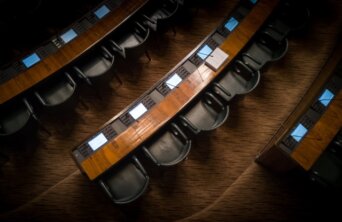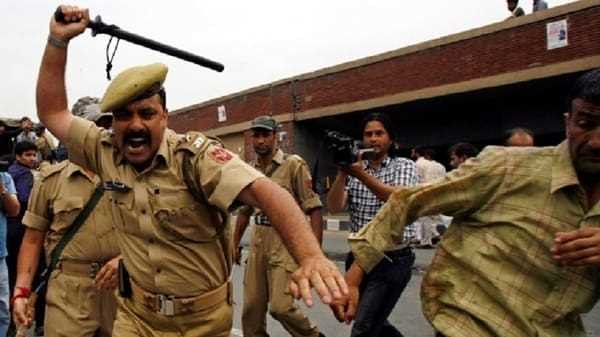- About
- Topics
- Picks
- Audio
- Story
- In-Depth
- Opinion
- News
- Donate
- Signup for our newsletterOur Editors' Best Picks.Send
Read, Debate: Engage.
| topic: | Democracy |
|---|---|
| located: | India |
| editor: | Hanan Zaffar |
India's ruling Bharatiya Janata Party (BJP) suspended two-thirds of opposition lawmakers from Parliament for obstructing proceedings. The opposition had protested outside the Parliament building in New Delhi, accusing the government of throttling democracy.
The protest took place following the arrest of six intruders who broke into the Indian Parliament's lower house during an ongoing proceeding and opened gas canisters. They were reportedly angry at the government over its economic policies and lack of job opportunities. The trespassers obtained a visitor's pass through the assistance of a BJP lawmaker.
Following the intrusion, opposition Members of Parliament (MPs) called for Prime Minister Modi and Home Minister Amit Shah to address the Parliament and discuss the matter. However, the BJP speaker, Om Birla, refused to allow the debate, asserting that the security breach was not under the government's remit.
The entire week witnessed unprecedented suspensions, with the total count of suspended MPs reaching a record number of 146.
Analysts view these mass suspensions as aligned with Modi's authoritarian approach, a stark contrast to the last major suspension in 1989, which was for a specific period.
This time, MPs have been suspended for the entire session. Critics and opposition leaders, including prominent opposition party Indian National Congress' President Mallikarjun Kharge, denounced the move as an assault on democratic norms, with senior party member Jairam Ramesh calling it "the murder of democracy".
The suspensions coincide with a crucial juncture for India's legislative process, as the BJP attempts to pass four significant new bills, including three that revamp the nation's colonial-era criminal codes. Despite the customary practice of bills undergoing parliamentary discussions, there have been several instances in the past where they were passed without any debate.
Since assuming power in 2014, the Modi government has been accused of eroding parliamentary democracy in India. Critics say the government has employed its substantial parliamentary majority to target opposition parties and MPs, who are critical of the government, subjecting many to harassment and investigations by central government agencies.
The party's approach to freedom of expression has also been scrutinized, with instances of curbing dissent and press freedom raising concerns about the health of democratic institutions. Additionally, the BJP's centralization of power and the use of legislation to advance its political agenda have led to accusations of authoritarian tendencies. The handling of social issues, such as citizenship and religious identity, has further fueled the perception that the party's policies may undermine the inclusive and pluralistic foundations of Indian democracy.
Meanwhile, the BJP government has defended its actions, alleging that the opposition is corrupt and power-hungry.
Image by Joakim Honkasalo.

